Each February, the Career Technical Education (CTE) community celebrates CTE Month to raise awareness of opportunities and impact achieved for every learner and leader through its programs.
This year’s CTE Month celebrations showcased the continued significance and success of CTE across the nation. Below, you’ll find highlights from this month, featuring events from states, partners, policymakers, and other champions of CTE!
Federal CTE Champions
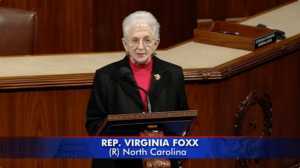
On February 8, Education and the Workforce Committee Chair Virginia Fox (R-NC) spoke on the House Floor to celebrate CTE Month, stating, “By equipping students with the competencies they need to be successful on the job, career and technical education programs give participants an invaluable head start.” Watch here
Representatives Glenn Thompson (R-PA) and Suzanne Bonamici (D-OR) Recognize February as Career and Technical Education Month
Co-chairs of the Congressional Career and Technical Education Caucus Reps. Thompson and Bonamici spoke on the importance of career technical education on Capitol Hill. Watch on C-SPAN Read the press release
State CTE Champions
Arkansas CTE Day at the Capitol

Throughout the month of February, Arkansas held regional CTE showcases to highlight local programs that serve as a bridge between K-12 and higher education, with the first one taking place at the Capitol Rotunda alongside Arkansas Governor Sarah Huckabee Sanders. Read the full press release
Maine’s CTE Month Showcase
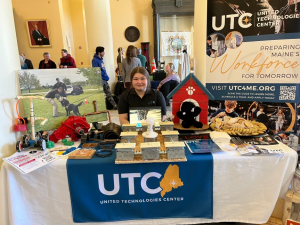 Maine kicked off Career and Technical Education (CTE) Month at the State House with a showcase featuring learners, instructors, and directors from 15 of the state’s 27 CTE centers. The showcase featured learners’ advanced skills in areas from biotechnology and hospitality to welding and graphic design. Notably, every instructor and director at the event reported an increase in “non-traditional students” participating in CTE programs. Read more about the kick-off
Maine kicked off Career and Technical Education (CTE) Month at the State House with a showcase featuring learners, instructors, and directors from 15 of the state’s 27 CTE centers. The showcase featured learners’ advanced skills in areas from biotechnology and hospitality to welding and graphic design. Notably, every instructor and director at the event reported an increase in “non-traditional students” participating in CTE programs. Read more about the kick-off
CTE Champions in Schools
Secretary of Education Cardona Joins President Biden’s Investing in America Tour
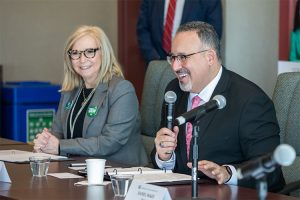 On February 21, U.S. Secretary of Education Miguel Cardona visited the Community College of Rhode Island (CCRI) as part of President Biden’s Investing in America Tour. The visit featured a tour of CCRI’s advanced manufacturing lab, a roundtable discussion with educational leaders, and dialogues with learners. Additional discussions took place with CCRI’s President Rosemary Costigan, Rhode Island Governor Dan McKee, and U.S. Representative Gabe Amo.
On February 21, U.S. Secretary of Education Miguel Cardona visited the Community College of Rhode Island (CCRI) as part of President Biden’s Investing in America Tour. The visit featured a tour of CCRI’s advanced manufacturing lab, a roundtable discussion with educational leaders, and dialogues with learners. Additional discussions took place with CCRI’s President Rosemary Costigan, Rhode Island Governor Dan McKee, and U.S. Representative Gabe Amo.
Cardona applauded CCRI’s intentional alignment of education with workforce needs, especially with the state’s Latine population as a Hispanic-Serving Instituion. The event demonstrated Rhode Island’s commitment to inclusive and high-quality CTE programs that serve both learner and industry – “I wanted a new career path, something where I could earn my diploma and show my kids it’s not too late to go back…I had my kids at a young age and was always focused on providing and making sure they had what they needed before I could go back to school. To finish will be a big accomplishment, not just for me but for them, too” said Fredy Vasquez, 38, a learner in the Advanced Manufacturing and Design degree program. Read more about Cardona’s visit and CCRI
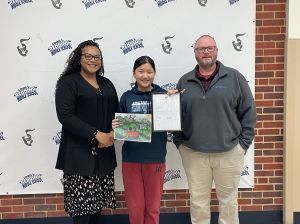 DACCTE Celebrates Poster Contest Winner
DACCTE Celebrates Poster Contest Winner
Delaware Advisory Council on Career and Technical Education (DACCTE), along with partners from the Department of Labor and Department of Education hosted a poster contest to showcase the talent represented in CTE classrooms every day. The winning poster was used to celebrate CTE Month in Delaware. Read more on DACCTE’s CTE Month activities
CTE Champions on Social Media
#ThisisCTE Social Media Campaign
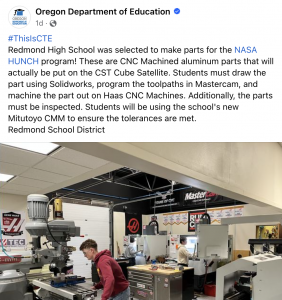 The Oregon CTE Youth Advisory Council launched a #ThisIsCTE social media campaign to highlight CTE programs and initiatives across the state and increase CTE awareness. View on Facebook | View on X (Twitter)
The Oregon CTE Youth Advisory Council launched a #ThisIsCTE social media campaign to highlight CTE programs and initiatives across the state and increase CTE awareness. View on Facebook | View on X (Twitter)
MSDE CTE Month Myth Busting
The Maryland State Department of Education (MDSE) conducted a social media campaign dispelling common myths about CTE.
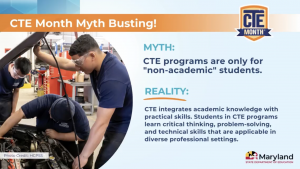
To continue to advocate for CTE year-round, explore our resources to reach learners, families, employers, and policymakers:
- Engage Families & Learners – Advance CTE
- Communicating the Value of Career Technical Education to Employers – Advance CTE
- Engaging Policymakers – Advance CTE
…and follow us on LinkedIn for the latest on CTE information, resources, research and more!


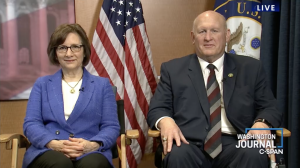
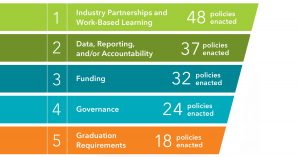

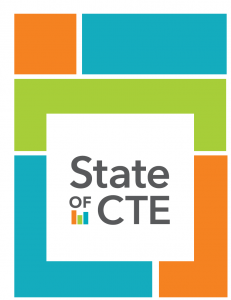 States make significant contributions to CTE programs through non-categorical, line item appropriations. Programmatic funding is distributed through periodic, legislatively established authorizations that are contingent on the availability of funds. States often place conditions on how money should be spent or used to promote state priorities. Additionally, a programmatic line item appropriation can be a recurring or a one-time investment. This blog highlights appropriations in industry-recognized credentials, Career Technical Student Organizations (CTSOs), career advisement, and educator preparation for fiscal year (FY) 2022. You can read more about categorical funding in the first blog in this series,
States make significant contributions to CTE programs through non-categorical, line item appropriations. Programmatic funding is distributed through periodic, legislatively established authorizations that are contingent on the availability of funds. States often place conditions on how money should be spent or used to promote state priorities. Additionally, a programmatic line item appropriation can be a recurring or a one-time investment. This blog highlights appropriations in industry-recognized credentials, Career Technical Student Organizations (CTSOs), career advisement, and educator preparation for fiscal year (FY) 2022. You can read more about categorical funding in the first blog in this series,  Additional Resources
Additional Resources Tell me more about your journey to the Fellowship.
Tell me more about your journey to the Fellowship.
 Advance CTE joins the Arkansas Department of Education in welcoming Ross White as the new State Career Technical Education (CTE) Director. Ross transitions into this role while fulfilling the duties of the Association for Career and Technical Education (ACTE)’s
Advance CTE joins the Arkansas Department of Education in welcoming Ross White as the new State Career Technical Education (CTE) Director. Ross transitions into this role while fulfilling the duties of the Association for Career and Technical Education (ACTE)’s  In support of this effort, Advance CTE recently published
In support of this effort, Advance CTE recently published 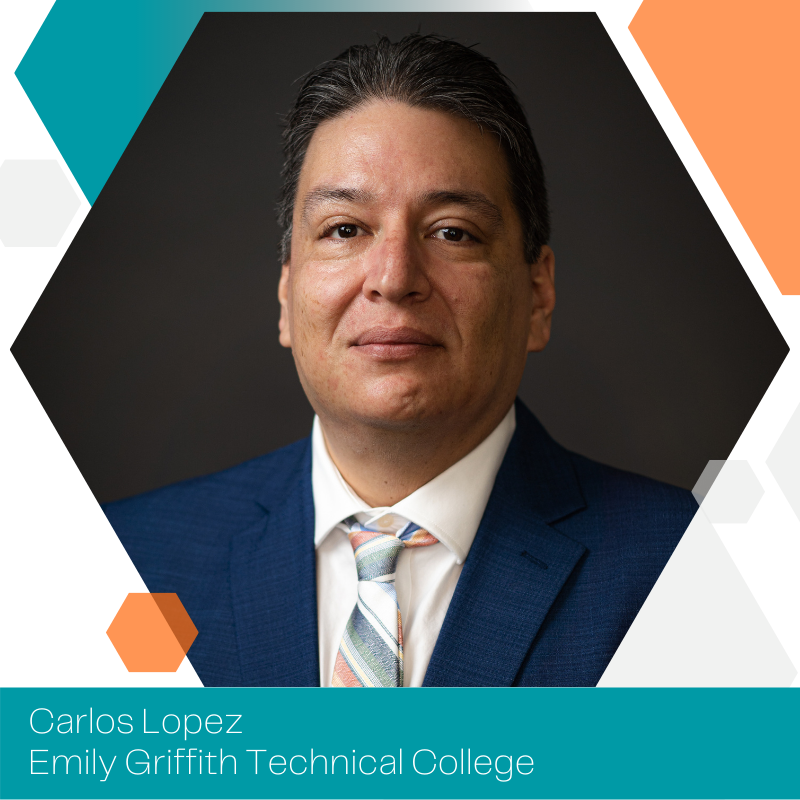 Carlos Lopez (Colorado) has over a decade of experience as an instructor, program coordinator and academic advisor at secondary and postsecondary institutions focused on historically marginalized learners. Carlos currently serves as the Associate Dean for the College of Health Sciences and Administration at Emily Griffith Technical College. They earned a bachelor’s degree in Psychology from Metropolitan State University of Denver and master’s degrees in Liberal Arts and Education Leadership and Policy Studies, Higher Education from St. John’s College – Santa Fe and University of Texas – San Antonio, respectively.
Carlos Lopez (Colorado) has over a decade of experience as an instructor, program coordinator and academic advisor at secondary and postsecondary institutions focused on historically marginalized learners. Carlos currently serves as the Associate Dean for the College of Health Sciences and Administration at Emily Griffith Technical College. They earned a bachelor’s degree in Psychology from Metropolitan State University of Denver and master’s degrees in Liberal Arts and Education Leadership and Policy Studies, Higher Education from St. John’s College – Santa Fe and University of Texas – San Antonio, respectively.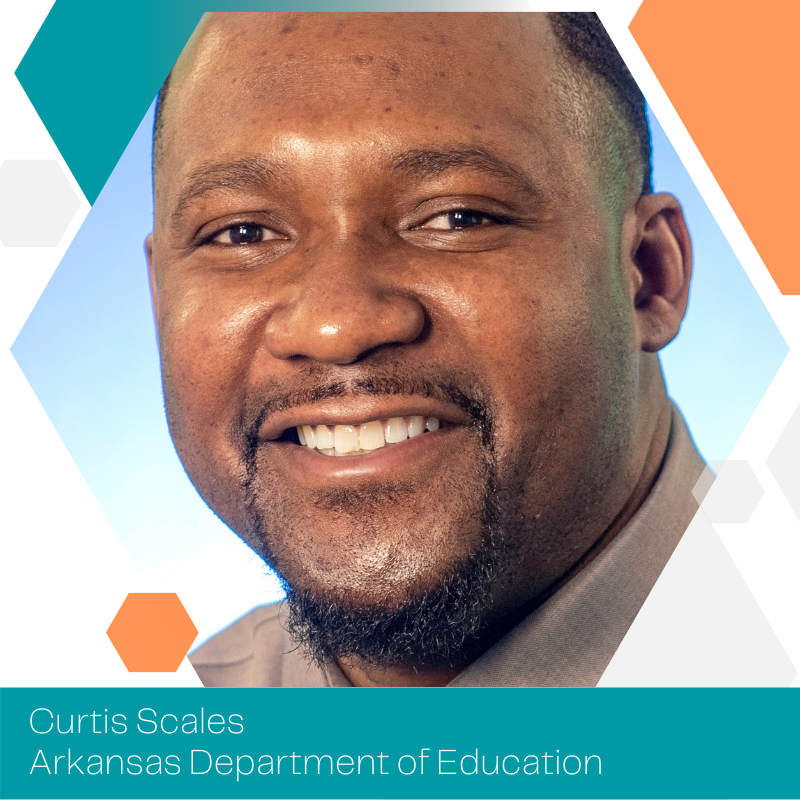 Curtis Scales (Arkansas) began his career in management training in the healthcare industry and translated his passion for wellness and supporting underserved populations into a career in education. He currently serves as the Program Manager for Special Populations at the Arkansas Department of Education. He earned a bachelor’s degree in Recreation Administration from the University of Arkansas, and master’s degrees in Management and Leadership and Human Resource Management from Webster University.
Curtis Scales (Arkansas) began his career in management training in the healthcare industry and translated his passion for wellness and supporting underserved populations into a career in education. He currently serves as the Program Manager for Special Populations at the Arkansas Department of Education. He earned a bachelor’s degree in Recreation Administration from the University of Arkansas, and master’s degrees in Management and Leadership and Human Resource Management from Webster University. Dr. Dimitria Harding (Minnesota) has over 15 years of experience in the CTE field working as a cytotechnologist before pursuing a career in higher education. Dr. Harding currently serves as a Dean of Health Sciences and Career and Technical Education at Minnesota State College. She received a bachelor’s degree in Health Science and a master’s degree in Community Health from Old Dominion University, and a doctorate in Organizational Leadership.
Dr. Dimitria Harding (Minnesota) has over 15 years of experience in the CTE field working as a cytotechnologist before pursuing a career in higher education. Dr. Harding currently serves as a Dean of Health Sciences and Career and Technical Education at Minnesota State College. She received a bachelor’s degree in Health Science and a master’s degree in Community Health from Old Dominion University, and a doctorate in Organizational Leadership.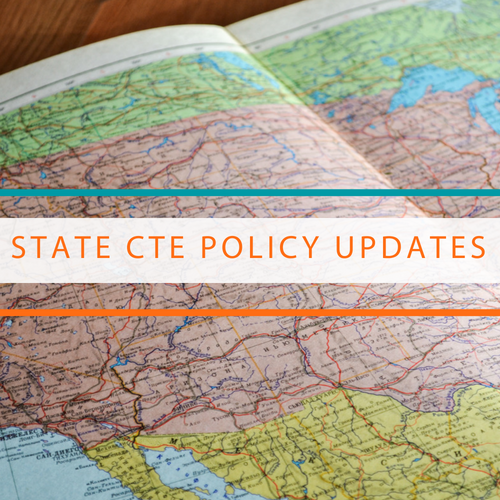 Preparing to enter the workforce is no easy task, especially as the COVID-19 (coronavirus) pandemic continues to transform the world of work. It is critical that apprenticeship, pre-apprenticeship and youth apprenticeship programs exist to allow learners of all ages to participate in significant work-based learning opportunities that connect their learning with on-the-job skills that they can leverage as they grow in careers of their choice. Pre-apprenticeship programs, for example, demonstrate
Preparing to enter the workforce is no easy task, especially as the COVID-19 (coronavirus) pandemic continues to transform the world of work. It is critical that apprenticeship, pre-apprenticeship and youth apprenticeship programs exist to allow learners of all ages to participate in significant work-based learning opportunities that connect their learning with on-the-job skills that they can leverage as they grow in careers of their choice. Pre-apprenticeship programs, for example, demonstrate